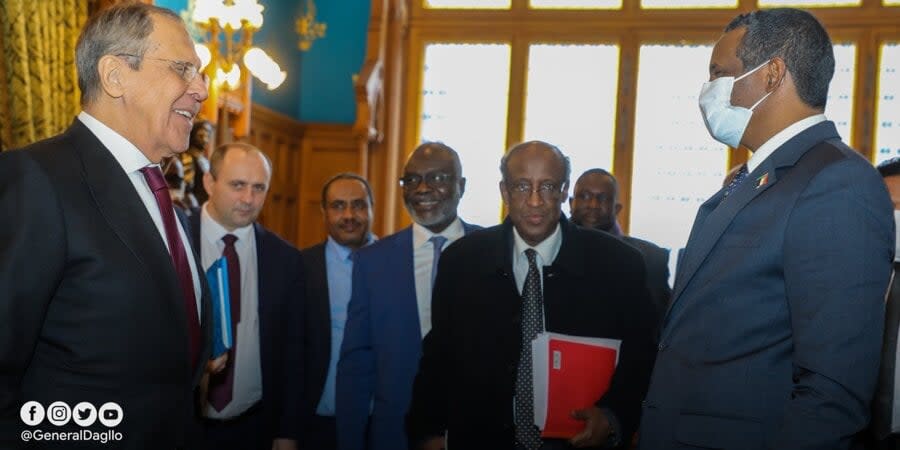Ukrainian diplomat on why Russia is interested in a coup in Sudan

Skirmishes between the regular army of Sudan under the leadership of Abdel Fattah al-Burhan and the Rapid Reaction Force (RSF), which answers to Mohamed Hamdan Dagalo, began on April 15. The clashes are rooted in a lack of agreement on a timeline for the integration of the RSF into the Sudanese Armed Forces as part of the country’s transition to civilian rule.
As Subkh explained to Radio NV, Dagalo had an agreement with Russia to establish a Russian naval base in Sudan.
The diplomat noted that this agreement was announced during a meeting between Dagalo and Russian officials on the day of the full-scale Russian invasion of Ukraine on February 24, 2022.
According to him, the Commander-in-Chief of the Sudanese Armed Forces of Sudan, General Burhan, strongly opposed this project.
“Accordingly, Russia could and, most likely did, make a bet on the rebels and on General Dagalo in order to...continue the implementation of their plans in Sudan,” Subkh said.
Read also: Ukrainian SkyUp aircraft reportedly damaged in Sudan, crew evacuated
As the diplomat explained, General Burkhan adheres to more pro-Western views, and it is important for him to maintain normal relations with the U.S. and the European Union.
He also said that Russia needs a naval base in Sudan to gain access to the Red Sea and control the export of oil from South Sudan, which goes through the Republic of Sudan.
“Therefore, Russia's control over the flow of energy resources and hydrocarbons is one of the primary goals,” Subkh said.
“Secondly, Russia’s military presence there makes it possible to influence the policy-making of at least the region of East and North-East Africa…The Russians are doing everything to expand their presence, including their military presence, on the African continent.”
Russia also sees benefit in a coup in Sudan because it would allow them to pump out natural resources from the country, including gold, thanks to the presence of Wagner Group mercenaries in the country, he explained.
Subkh believes that the integration of the RSF into the ranks of the Sudanese Armed Forces has turned out to be a problem, most likely because RSF commanders have realized that after that they would lose control over resource deposits which they now control.
Read also: Kremlin has plans to turn Moldova into Russian satellite, investigative media reveals
The diplomat said that Wagner mercenaries provide “certain logistics” and security at these locations, which means that they are an income stream for Russia, as well.
“They also say that there were also channels for trade in other prohibited goods, which were controlled by Wagner along with local leaders,” Subkh said.
“It seems that Russia has bet specifically on this regional dimension of the Sudanese army, and over the past year or two, the Russian side has concluded certain agreements with troops subordinate to General Dagalo, which guaranteed Russia the unhindered opportunity to pump out and illegally export in particular gold, but also other minerals, from Sudan.”
He added that the scale of the theft of natural resources from Sudan by Wagner forces cannot be estimated, “because the numbers vary widely and official data can hardly be found.”
“These are mostly private investigations and information that one or another of the world's leading publications got hold of,” Subkh noted.
On April 15, clashes broke out in Sudan between the regular army and the Rapid Reaction Force (RSF). The conflict flared up after several days of tension.
The Rapid Reaction Force said it had taken control of the presidential palace, the residence of the commander of the army, and the international airport in the Sudanese capital Khartoum, as well as airfields in the northern city of Merov and in El Obeid.
Read also: Russia continues to use Black Sea to export oil despite EU sanctions, says expert
Witnesses say they saw armored vehicles on the streets and heard the rumble of heavy weapons. "Heavy fighting" was reported near the presidential palace and army headquarters. Fighter aircraft were spotted in the sky, presumably attacking targets associated with the RSF.
The army said that the RSF tried to attack its troops at several positions, but the Rapid Reaction Force said that one of their bases had been attacked earlier. A confrontation could significantly aggravate the security situation in a country already facing an economic crisis and outbreaks of violence.
The military has been leading Sudan since a 2021 coup that ended a power-sharing deal negotiated after the ouster of longtime dictator Omar al-Bashir.
The army is subordinate to the military government (Sovereign Council) headed by General Abdel Fattah al-Burhan, and the Rapid Reaction Force - to Vice President General Mohammed Hamdan Dagalo. As part of the proposed transition to civilian rule, the RSF is supposed to be integrated into the Armed Forces, but the generals cannot agree on when this should happen. The dispute has escalated into an armed struggle.
On April 16, it emerged that hostilities in Sudan had killed three employees of the UN World Food Program (WFP) and wounded two others.
We’re bringing the voice of Ukraine to the world. Support us with a one-time donation, or become a Patron!
Read the original article on The New Voice of Ukraine

